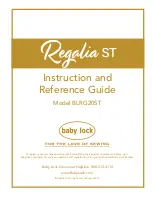Summary of Contents for Huskylock 936
Page 1: ...KEEPING THE WORLD SEWING User s Guide ...
Page 42: ... 38 5 thread overlock Double chain stitch C D A B 1 2 5 6 7 8 4 3 E D A B C D A B E D A B ...
Page 49: ... 45 Cover stitch wide Cover stitch narrow C D A B C D A B E D A B E D A B ...
Page 50: ... 46 Triple cover stitch C D A B E D A B ...
Page 72: ... 68 11 NOTE Memory No Date Note ...
Page 73: ... 69 Memory No Date Note ...
Page 74: ... 70 Memory No Date Note ...
Page 75: ... 71 Memory No Date Note ...



































